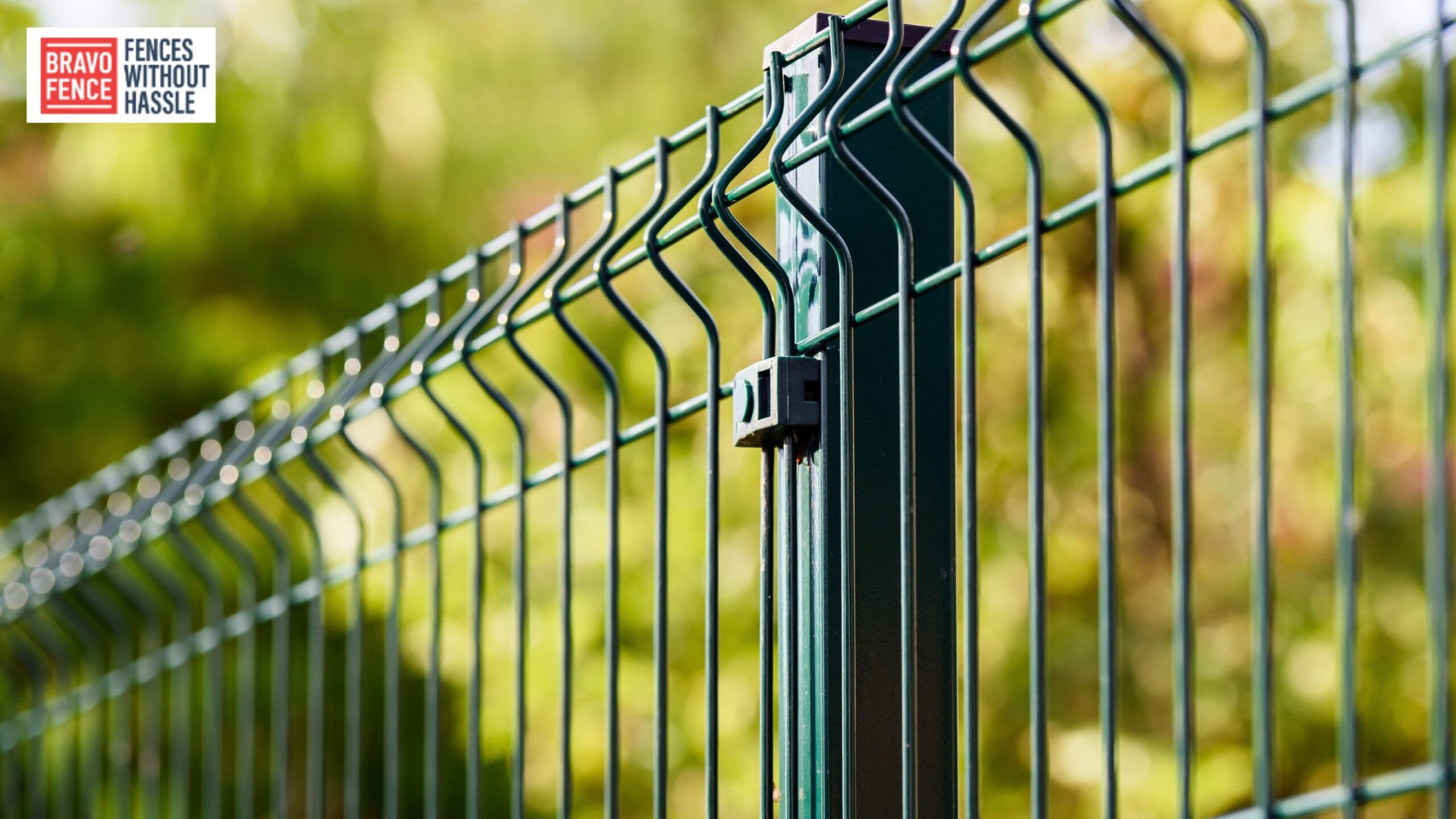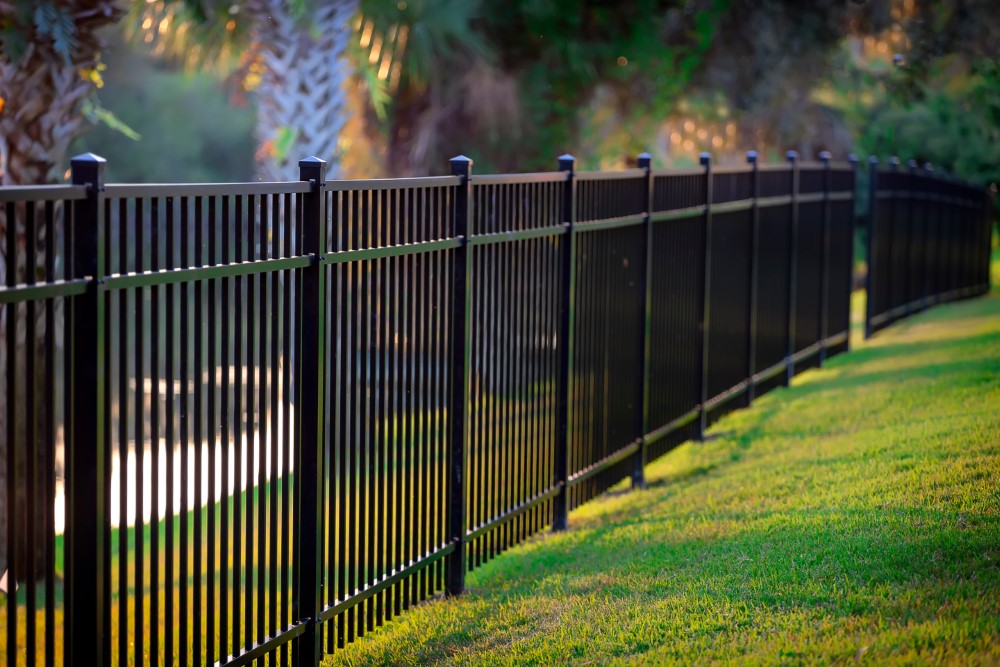
Top 5 Types of Security Fences for Home and Business Protection
In an increasingly security-conscious world, safeguarding properties—whether residential or commercial—has become paramount.
One practical and visually appealing way to enhance security is through the installation of home security fencing.
These fences not only demarcate property lines but also offer varying levels of protection against unauthorized access, intrusion, and vandalism.
Below, we delve into the top five types of security fences, exploring their features, benefits, and suitability for different settings.
Chain Link Fences

Overview:
Chain link fences are among the most common and versatile types of fencing used for both residential and commercial purposes.
Made from galvanized steel wire, these fences are known for their durability, affordability, and ease of installation.
Features:
Material: Typically made of steel coated with zinc to prevent rust and corrosion.
Height Options: They are available in various heights, from 3 to 12 feet, making them adaptable to different security needs.
Mesh Size: The mesh openings can vary in size, which can be adjusted based on the level of security required.
Benefits:
Cost-Effective: Chain link fences are generally more affordable than other types of security fencing.
Low Maintenance: Due to their weather-resistant coating, they require minimal maintenance.
Visibility: The open mesh design allows for visibility, which can deter potential intruders as they know they can be easily seen.
Suitability:
Chain link fences are ideal for residential properties, schools, parks, and industrial areas.
They are particularly effective in securing large areas and can be combined with additional security measures such as barbed wire or razor wire for enhanced protection.
Electric Fences
Overview:
Electric fences use electrical currents to deter and prevent trespassing. They are commonly used for high-security applications, including around businesses, military installations, and high-value properties.
Features:
Components: Includes electrified wires, insulators, and a power source.
Modern electric fences are equipped with energizers that control the current.
Voltage Levels: The voltage can be adjusted according to the level of security needed.
Signage: Warning signs are usually posted to inform people about the electric nature of the fence.
Benefits:
High Security: Provides a strong deterrent against intruders due to the risk of electric shock.
Adjustable: Voltage levels and pulse rates can be adjusted to suit specific security needs.
Versatile: Can be used in conjunction with other types of fences for added security.
Suitability:
Electric fences are well-suited for high-security areas such as correctional facilities, military bases, and high-value commercial properties.
They require careful installation and regular maintenance to ensure they are functioning correctly and safely.
Steel Security Fences
Overview:
Steel security fences are robust and offer high levels of protection.
They are typically constructed from heavy-duty steel and are designed to withstand physical attacks.
Features:
Material: Made from solid steel or steel bars, often with a powder-coated finish to prevent rust.
Designs: Available in various designs, including picket, panel, and mesh styles.
Height and Thickness: Generally taller and thicker than other types of fences, providing superior strength and durability.
Benefits:
Durability: Steel fences are highly resistant to cutting, bending, and breaking.
Aesthetic Appeal: Available in various designs and finishes, making them suitable for both modern and traditional aesthetics.
Enhanced Security: The solid construction makes it difficult for intruders to breach the fence.
Suitability:
Steel security fences are ideal for commercial properties, industrial facilities, and high-end residential areas.
They are instrumental in locations where maximum security is a priority.
Vinyl Privacy Fences
Overview:
Vinyl privacy fences offer both security and privacy. Made from PVC (polyvinyl chloride), these fences provide a high level of seclusion while also serving as a deterrent against intruders.
Features:
Material: Made from durable PVC that is resistant to weathering, cracking, and fading.
Design: Available in solid panels that block visibility, creating a private and secure environment.
Height Options: Typically available in heights ranging from 4 to 8 feet.
Benefits:
Low Maintenance: Vinyl fences do not require painting or staining and are easy to clean.
Privacy: The solid design ensures complete confidentiality and restricts visibility into the property.
Durability: Resistant to various environmental factors such as moisture, UV rays, and insects.
Suitability:
Vinyl privacy fences are best suited for residential properties and commercial spaces where privacy and security are both critical.
They are ideal for creating secluded areas such as backyards and outdoor spaces.
Wrought Iron Fences
Overview:
Wrought iron fences are known for their classic aesthetic appeal and high-security features.
They are made from malleable iron and are often handcrafted to create intricate designs.
Features:
Material: Made from wrought iron, which is heated and hammered into shape.
Designs: Available in a variety of styles, including ornate patterns and simple bars.
Height and Strength: Generally tall and robust, providing a formidable barrier.
Benefits:
Elegance: Offers a sophisticated and timeless look that enhances the visual appeal of a property.
Strength: Provides a robust barrier that is difficult to breach.
Customizable: Can be customized to fit specific design preferences and security requirements.
Suitability:
Wrought iron fences are ideal for high-end residential properties, historic sites, and upscale commercial spaces.
They are particularly suited for areas where aesthetic appeal and security are both priorities.
Conclusion
Selecting the correct type of security fence depends on various factors, including the level of protection required, the environment, and aesthetic preferences.
Each type of fence offers unique features and benefits, making it essential to assess your specific needs before making a decision.
Whether you choose a cost-effective chain link fence, a high-security electric fence, a durable steel fence, a private vinyl fence, or an elegant wrought iron fence, investing in a security fence is a crucial step toward enhancing the safety and protection of your property.
For professional guidance and to explore your options, Bravo Fence Company.
FAQs
What are the most common types of security fences available?
The most common types of security fences are:
- Chain Link Fences: Durable and cost-effective, suitable for a variety of applications.
- Electric Fences: Ideal for high-security needs, deterring intruders with electrical currents.
- Steel Security Fences: Robust, providing high levels of protection.
- Vinyl Privacy Fences: Offer privacy and security with low maintenance.
- They wrought Iron Fences: Elegant and robust, combining aesthetic appeal with security.
How do I determine the best type of security fence for my property?
To determine the best type of security fence, consider:
- Level of Security Needed: High-security areas may require electric or steel fences, while residential properties might benefit from vinyl or wrought iron fences.
- Environment and Climate: Choose materials that are resistant to local weather conditions (e.g., rust-resistant coatings for steel).
- Aesthetic Preferences: Select a wall that complements the property’s design, such as wrought iron for a classic look or vinyl for a modern appearance.
- Budget: Balance your security needs with your budget. Chain link fences are typically more affordable, while wrought iron and steel may be more expensive.
Are electric fences legal for residential properties?
The legality of electric fences varies by location. Some areas have restrictions or require specific permits for their use. Always check local regulations and obtain necessary permits before installing an electric fence.
How do I maintain different types of security fences?
- Chain Link Fences: Minimal maintenance is required. Regularly inspect for rust or damage and clean as needed.
- Electric Fences: Regularly check the power source and wiring for functionality. Ensure that warning signs are visible and up-to-date.
- Steel Security Fences: Inspect for rust or damage. Repaint or recoat as necessary to maintain durability.
- Vinyl Privacy Fences: Clean with soap and water. Inspect for cracks or damage and repair as needed.
- Wrought Iron Fences: Regularly inspect for rust or paint damage. Repaint and treat with rust inhibitors as required.
Can I combine different types of fences for enhanced security?
Yes, combining different types of fences can enhance security. For example, a chain link fence topped with barbed wire or an electric fence can provide additional protection. Always ensure that the combination complies with local regulations and is installed professionally for maximum effectiveness.
What are the installation requirements for each type of security fence?
- Chain Link Fences: Typically require a level ground and proper post installation. Easy to install with basic tools.
- Electric Fences: Require a power source and adequate insulation. Installation may involve more technical aspects.
- Steel Security Fences: Require solid post and panel installation. They may need professional installation due to their weight and complexity.
- Vinyl Privacy Fences: Installation involves securing posts and aligning panels. It is generally straightforward but may require precise measurements.
- Wrought Iron Fences Often require custom fabrication and professional installation due to their design and weight.
How long do security fences typically last?
- Chain Link Fences: Typically last 10-20 years, depending on maintenance and environmental factors.
- Electric Fences: Can last indefinitely with proper maintenance and care.
- Steel Security Fences: Usually last 20-30 years, especially with regular maintenance.
- Vinyl Privacy Fences Often last 20-30 years, as they are resistant to weathering and damage.
- Wrought Iron Fences: Can last 30-50 years or more with proper maintenance and care.
Are there any additional security features that can be added to these fences?
Yes, additional security features can enhance the effectiveness of your fence:
- Cameras and Motion Sensors: Integrate with electric or chain link fences for surveillance and alerts.
- Alarm Systems: Can be added to electric fences for immediate response to breaches.
- Barbed Wire or Razor Wire is effective when added to the top of chain link or steel fences for increased deterrence.
- Lighting: Motion-activated lights can increase visibility and deter intruders.
Tags: Complete Guide to Residential Security, Complete Guide to Security Fences, Everything You Need to Know About Business Security, Everything You Need to Know About Steel Security Fences, Explore Helpful Resources on Commercial Fencing, Explore Helpful Resources on Vinyl Privacy Fences, Inspiration and Tips on High Security Fencing, Inspiration and Tips on Wrought Iron Fences, Top Ideas and Insights About Chain Link Fences, Top Ideas and Insights About Electric Fences
